
Will talks on Covid-19 travel bubbles get Hong Kong anywhere?
For Hong Kong’s battered tourism industry, the announcement that officials have been in contact with 11 countries over forming travel bubbles brought a ray of hope in the coronavirus gloom.
But questions remain as to how soon this can happen and which side has the decisive say on when to open borders.
Commerce chief Edward Yau Tang-wah revealed on Wednesday that the government had already started arranging talks between local health professionals and their counterparts in Japan and Thailand, two of the most popular holiday destinations for the city’s residents.
To make bubbles possible, Yau said, coronavirus tests before departure and upon arrival might be necessary, and the two sides would need to discuss whether negative results at both ends meant travellers could skip quarantine or spend less time in isolation.
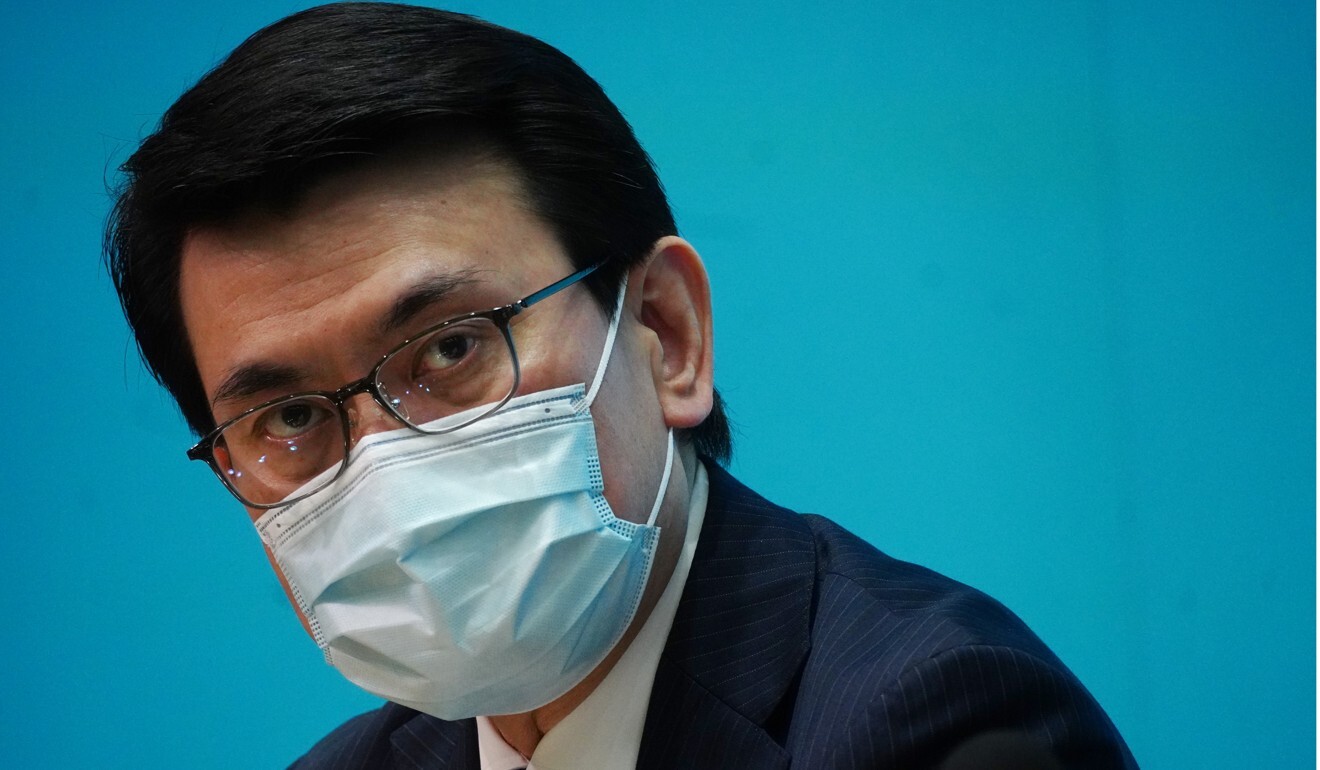
“The situation will keep changing, so I have to stress that preparations should be conducted earlier because different places may have different requirements,” he said.
So without wanting to burst any bubbles, the Post looks at where the 11 countries – Japan, Thailand, Singapore, Malaysia, South Korea, Vietnam, Australia, New Zealand, France, Germany and Switzerland – stand on reopening their borders.
Japan
People from 159 countries and regions, including Hong Kong, are currently not allowed to enter Japan unless there are exceptional circumstances. However, this month it started taking in foreign nationals with resident status, provided they had tested negative for Covid-19.
The Japanese consulate in Hong Kong said negotiations with the city were under way but declined to disclose details at this stage.
The Covid-19 situation at certain destinations, including Tokyo, was still fluctuating, according to Hong Kong tourism sector lawmaker Yiu Si-wing, who suggested officials look at travel to southern Okinawa island as a first step, case numbers permitting.
“Can we pick some places to start with first? We only can get data and experience to improve the scheme after we implement it,” he said.
Japan had confirmed more than 72,000 virus cases as of Wednesday, with almost 1,400 related deaths.
The Japanese government wants to seal a deal with Singapore this month to allow visitors to travel both ways. It also launched discussions with 15 other economies on the gradual reopening of borders for some qualified residents and business travellers.
As of Tuesday, borders were reopened for some residents from Thailand, Vietnam, Taiwan, Cambodia, Laos, Malaysia and Myanmar although they had to have tested negative for the virus and would have to self-quarantine for 14 days.
Outlook based on current travel advisories tracked by the Post: promising but smaller cities may come first.
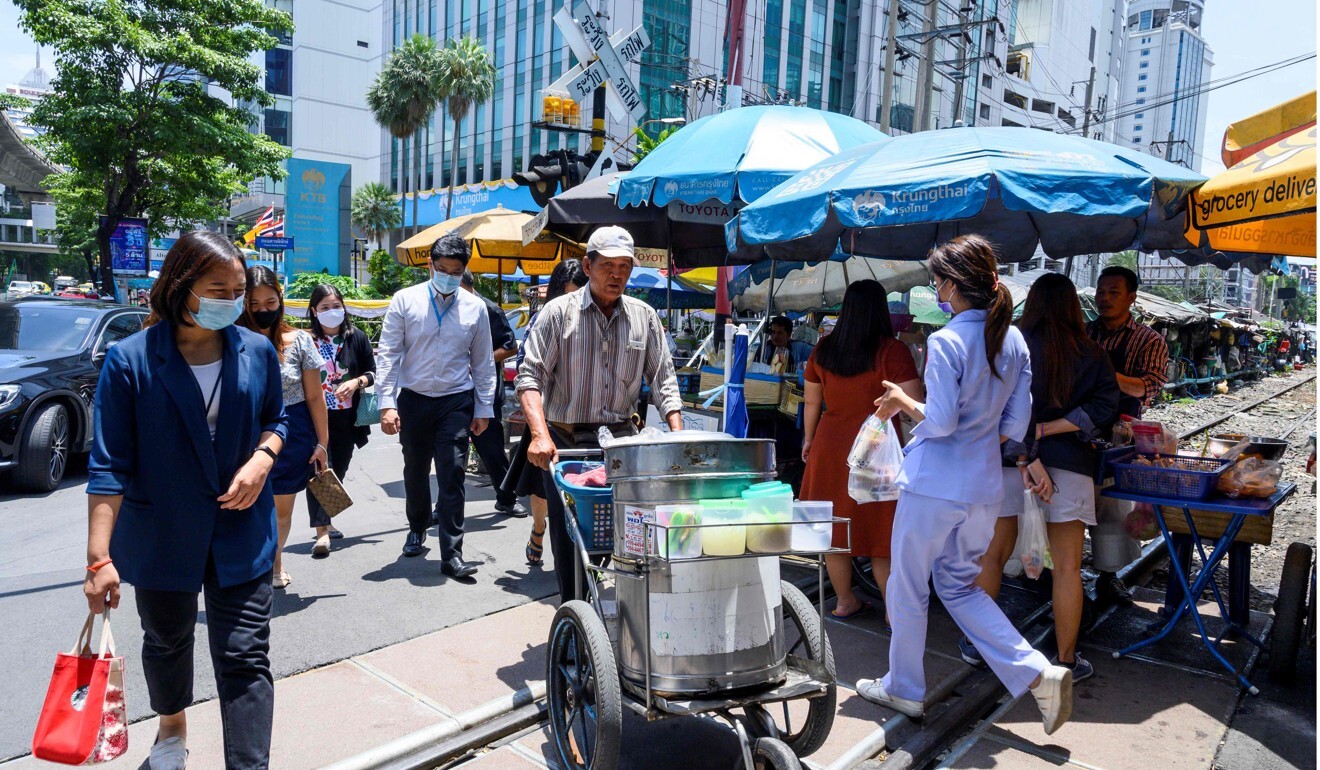
Thailand has been successful in containing the coronavirus.
Thailand
Thailand’s borders remain closed for foreign nationals although there are some exceptions.
A trial scheme allowing foreign tourists to visit the country was being finalised this week, under which arrivals would be confined to a designated resort or area for a 14-day quarantine period. Under another arrangement, visitors would be allowed to travel around Thailand after completing three weeks’ quarantine on Phuket Island and obtaining negative results in several Covid-19 tests.
The country’s Covid-19 containment efforts have been relatively successful, having recorded just 3,447 cases in total. However, it suffered a blip last week with its first locally transmitted case since late May.
Asked if Thailand was likely to be Hong Kong’s first travel bubble, Yau said both sides would need to monitor the situation. “Talking to it first doesn’t mean it will definitely bear fruit,” he said.
Outlook: promising but again on a limited basis.
Singapore
The city state has been gradually easing its coronavirus measures and reopening the economy.
Last month, it moved to relax restrictions for incoming travellers from “low-risk” regions such as mainland China, Taiwan and Malaysia, allowing them to serve a seven-day stay-home notice, rather than the 14 days required for all other travellers.
On September 1, it unilaterally opened its borders to travellers from Brunei and New Zealand, after the government said the Covid-19 situation in both nations was under control and the risk of importing the virus was low.
Changi Airport on Tuesday welcomed the first batch of 14 travellers from the two countries and they were required to take a Covid-19 test upon arrival but exempted from quarantine.
Singapore has had just over 57,000 virus cases, mostly among low-wage migrant workers living in cramped dormitories.
Yiu, the lawmaker, said Hong Kong had confidence in Singapore despite the surge in Covid-19 figures earlier. “If the pandemic is under control, Hongkongers will go to Singapore,” he said.
The Singapore consulate-general in Hong Kong told the Post it welcomed the announcement from the government on interest in starting travel talks.
“Singapore has launched several fast-lane/green-lane arrangements so far, and is exploring similar arrangements or travel bubbles with other key partners,” it said, adding that resuming safe cross-border travel between Singapore and Hong Kong would benefit both sides given their strong business and family ties.
Outlook: promising but will have to wait until the situation in Hong Kong eases.
Malaysia
Malaysia said it was not yet ready to open its borders for tourists and the government called off plans to set up a travel bubble with New Zealand and Australia in late August.
Even travel with neighbouring Singapore has been tightened again. Health minister Adham Baba said on Monday that travellers from the city state would have to be quarantined at government centres if their destination was beyond the southern state of Johor. The Periodic Commuting Arrangement previously allowed business travellers to undergo home quarantine.
Yiu noted the pandemic was stable in Malaysia, which had recorded just over 9,500 cases, and Hong Kong residents would want to visit there, although the destination was not as popular as Thailand and Japan.
Outlook: unlikely in the near-term.
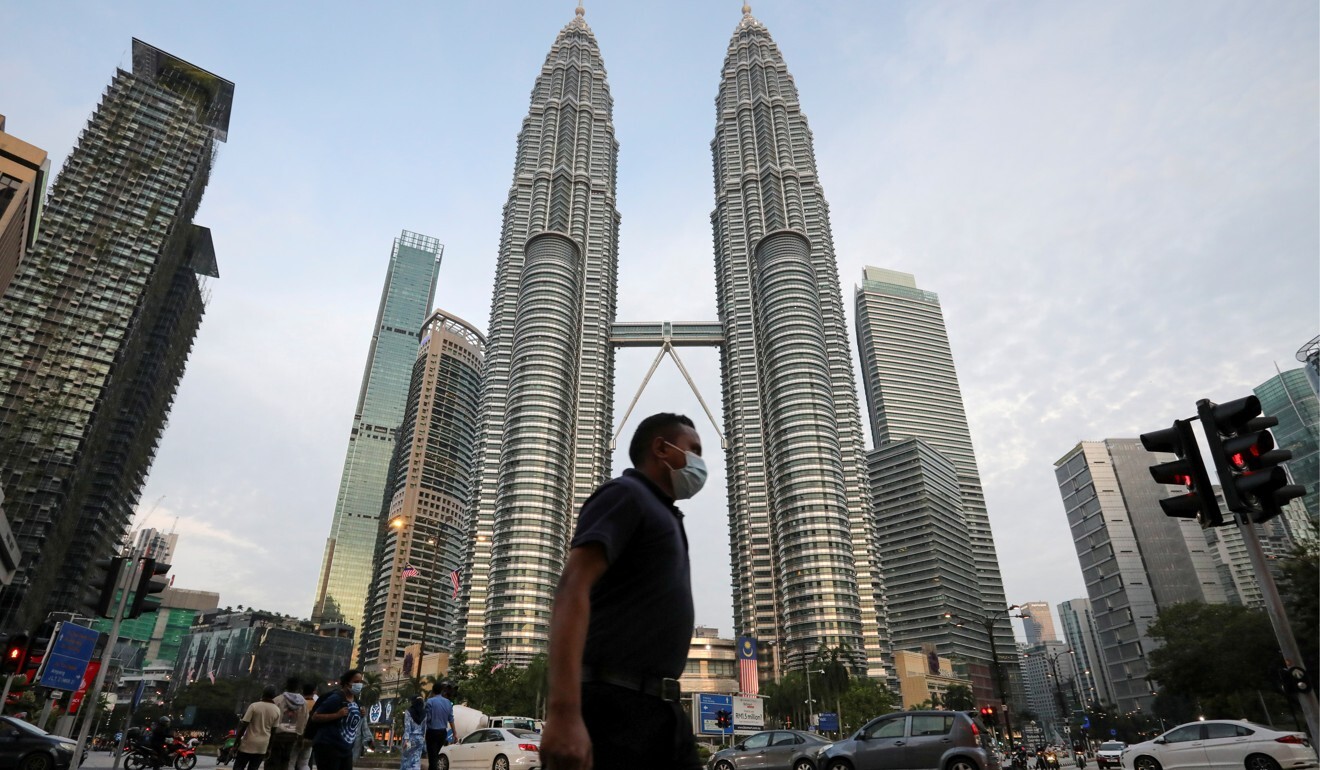
Malaysia called off plans to set up a travel bubble with New Zealand and Australia.
South Korea
South Korea has been battling a second wave of infections that emerged in mid-August, with about 4,500 cases confirmed in the greater Seoul area over the past three weeks.
On September 4, the country and Singapore agreed to allow essential business and official travel between them, which required visitors to have pre-departure and post-arrival Covid-19 tests and stick with a pre-approved itinerary for the first 14 days in the destination.
It has had a similar arrangement with mainland China since May and formed a travel corridor for essential business and diplomatic trips with Indonesia under different conditions last month.
Yiu said the public health crisis there was fluctuating and if its anti-epidemic measures could be on a par with Hong Kong, there would be room to set up a bubble.
“Hongkongers feel Koreans usually comply with the rules. Just right now, some people there might not have fulfilled the government’s requirements in their daily lives,” he said.
Outlook: still uncertain but going by past precedents, business travel is likely to be prioritised.
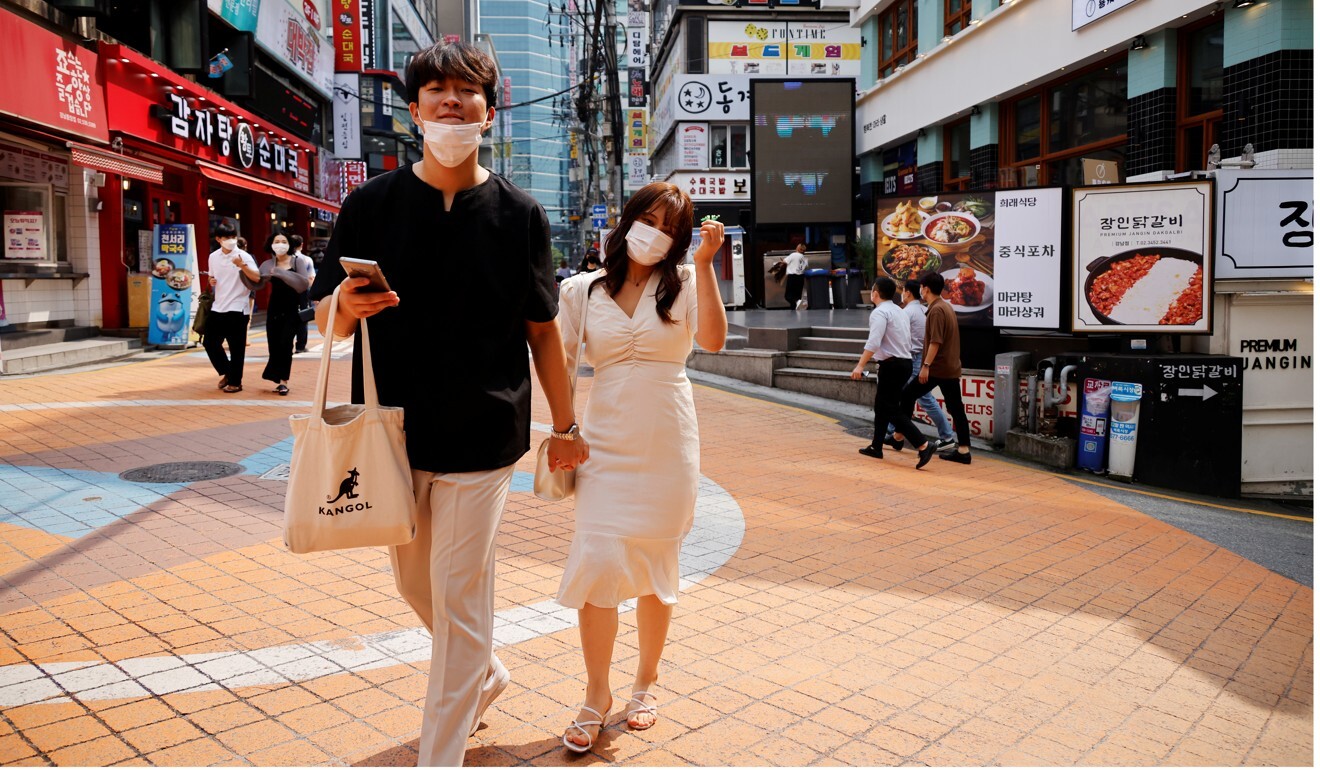
A second wave of infections emerged in South Korea in mid-August.
Vietnam
Since September 1, foreign visitors such as experts, investors, managers and diplomats have no longer been required to go through mandatory 14-day quarantine if staying in Vietnam for less than 14 days.
The country, which has had about 1,000 coronavirus cases in total, wants to resume international flights to destinations such as Guangzhou, Seoul, Tokyo, Taipei, Phnom Penh and Laos from September 15.
Freddy Yip Hing-ning, president of the Hong Kong Travel Agent Owners Association, said forming travel bubbles within the Asia-Pacific region was a top priority as many countries desperately needed a tourism rebound to save their economies.
“The most popular outbound destinations for Hongkongers are Thailand, Japan, South Korea. Other than that it would be Singapore, Malaysia, Indonesia and Vietnam,” Yip said. “These countries are within Asia and they [need tourists really badly] because their economy needs it.” Outlook: business travellers will be ahead of the queue, again going by past precedent.
Australia
Just last week, Australia said it would extend its international border restrictions for at least another three months to protect the country against the spread of the coronavirus. Australians and permanent residents are also banned from leaving the country unless granted an exemption.
The country has had about 26,400 virus cases, including a serious outbreak recently in Victoria state.
The Australian consulate in Hong Kong told the Post the federal government was considering when and how to reopen its borders. It was working to set up a quarantine-free travel zone with neighbouring New Zealand, with talks ongoing for some months.
The consulate said the government would look at options for reopening travel with other countries and regions assessed to be low risk, starting with interested Pacific island nations.
“In parallel, we are working on arrangements for priority traveller cohorts including international students and labour mobility participants,” it said.
Outlook: unlikely in the near-term.
New Zealand
A spokesman for the Ministry of Foreign Affairs and Trade said that it was aware of the city’s intention to form travel bubbles with a range of countries including New Zealand.
He said New Zealand was working as a priority with Australia to establish a travel zone, and with the Cook Islands and Niue, island nations in the South Pacific, to develop safe travel arrangements.
“Once we are confident in the necessary health and border requirements and protocols, we may be in a position to explore options with other countries,” he said.
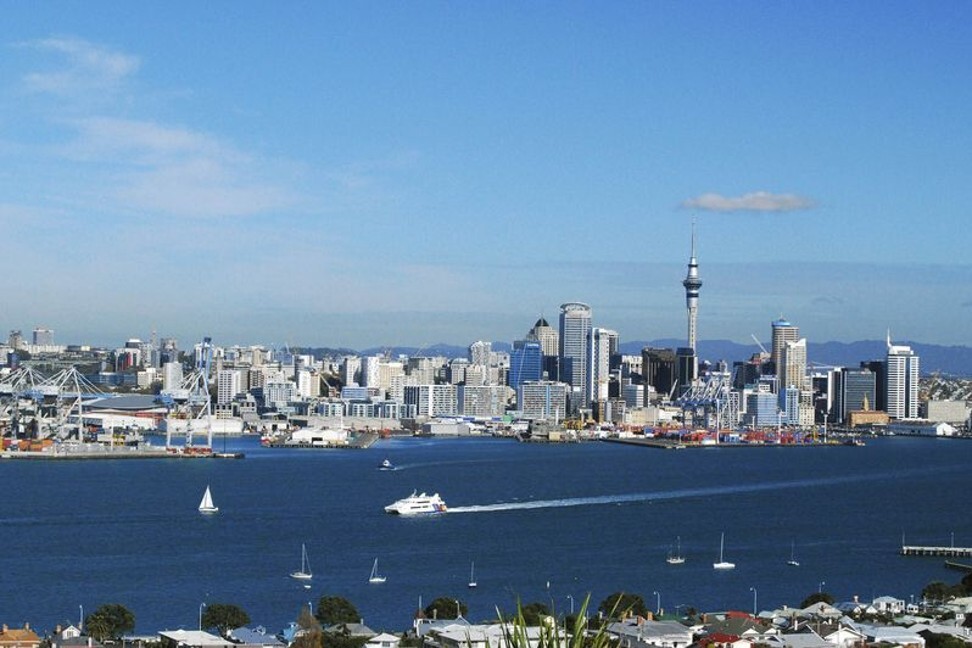
The country has generally been very successful in limiting the spread of Covid-19, having had under 1,800 cases.
The government has advised citizens not to travel overseas. New Zealanders must undergo quarantine for 14 days at a government facility after returning from abroad.
Yau, the commerce minister, said New Zealand and Australia wanted to form their travel zone first before creating one with Hong Kong.
Outlook: unlikely in the near-term.
France
France is currently experiencing a surge in Covid-19 cases, after it relaxed restrictions with other European countries over the summer, and has subsequently tightened border rules.
Since August 1, those travelling to France from countries labelled as high risk needed to show a negative Covid-19 test result taken less than 72 hours before their flight.
Travellers from everywhere except the European Union, Britain and places including Switzerland, must self-isolate for 14 days upon arrival.
The French consulate in Hong Kong declined to comment on the travel bubble plan with the city.
Outlook: unlikely in the near-term.
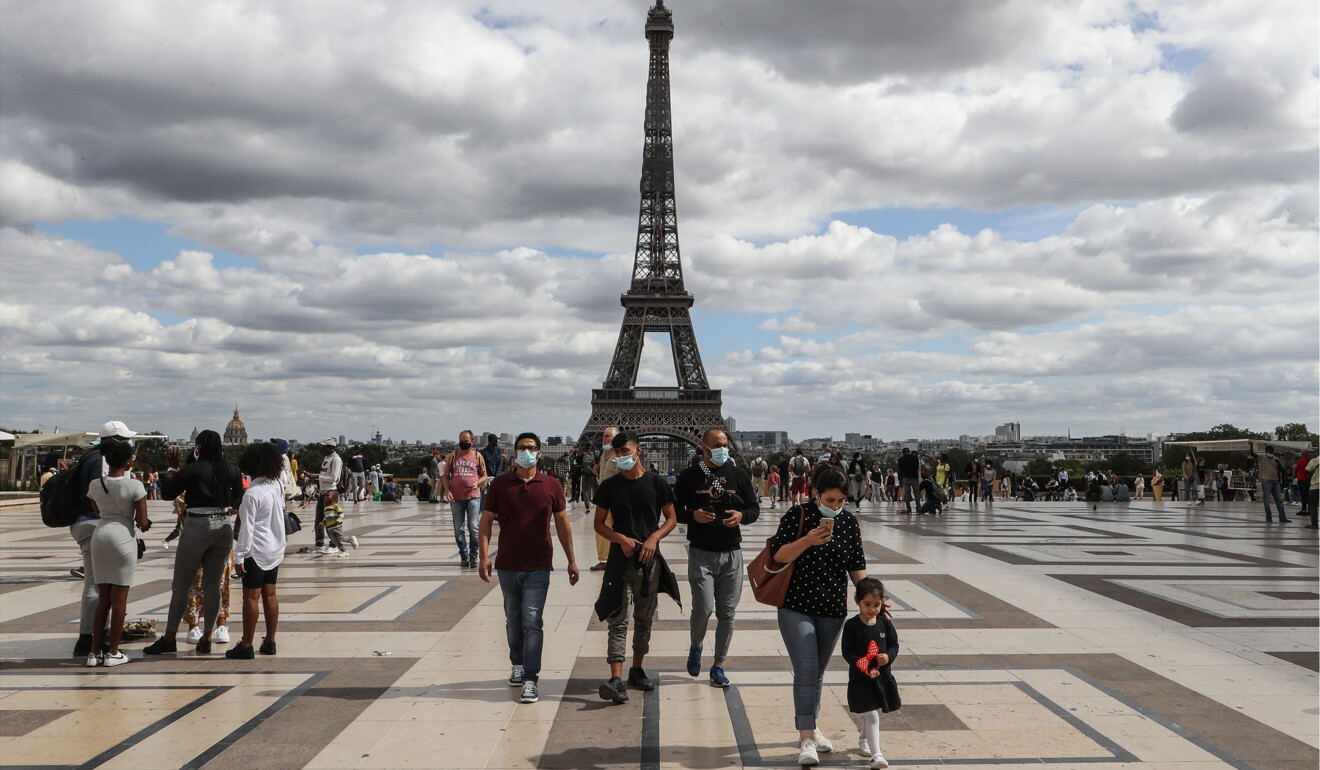
France is facing a resurgence of the virus.
Germany
The German consulate said negotiations with Hong Kong over a travel bubble remained at “a very early stage and could not give any further information on the developments”.
Germany’s borders with other European countries reopened in June and it has launched a Corona-Warn-App, a contact tracing application. The country has also been representing the European Union in discussing with Hong Kong the formation of travel corridors with other European countries. There is no travel bubble outside the EU at present.
“[A travel bubble with] Europe right now is impossible,” Yip of the association said.
“The Hong Kong government just made the first move to approach these countries but it does not mean that they [will reciprocate] the desire to resume travel to Hong Kong just yet.”
Outlook: unlikely in the near-term.
Switzerland
The Swiss consulate said it had been contacted by the Hong Kong government regarding a potential travel bubble.
“We share the goal of restoring cross-border travel mobility. We hope to find a solution which also involves other European countries,” it said.
A 10-day quarantine on arrival is mandatory for travellers who spent more than 24 hours in an area labelled as high risk in the past two weeks. Until September 7, Hong Kong was listed as a high-risk area but has since been taken out of it.
Outlook: uncertain.










